Introduction
In today's fast-paced world, prioritizing well-being is essential. This article explores the role of HR Benefits Managers in promoting the well-being of their teams. It emphasizes the importance of empathy, non-judgmental approaches, and tailored support in creating a trusting environment for personal growth.
The article also highlights the significance of continuous learning, goal-oriented coaching, and a focus on holistic wellness. Furthermore, it delves into the adaptability and flexibility required in crafting individualized strategies for employees. Lastly, the article discusses the accountability, empowerment, authenticity, and personal connections that HR Benefits Managers can foster to create a positive work environment.
With a motivational tone, this article inspires HR Benefits Managers to take action and prioritize the well-being of their teams.
Empathy and Non-Judgmental Approach
Premier health mentors are the cornerstone of successful wellness programs, embodying the essential qualities of empathy and non-judgment that allow individuals to navigate their unique health journeys. Embracing the complexity of personal challenges, these coaches create a sanctuary where concerns and aspirations can be expressed freely, paving the way for a trusting relationship essential to personal growth and well-being. They embrace the belief that mentoring is a collaborative, thought-provoking endeavor that sparks a person's motivation to achieve their full potential, as endorsed by the International Coaching Federation. This transformative process is distinguished from therapy by its focus on future-oriented goals and professional development, rather than past experiences. The developing domain of wellness guidance, highlighted by Leigh-Ann Webster of the National Board for Health and Wellness Coaching, emphasizes the significance of organized communication and customized support. As coaching becomes increasingly recognized for its role in holistic health and workplace performance, the meticulous crafting of each coaching interaction is crucial for fostering profound and lasting change.
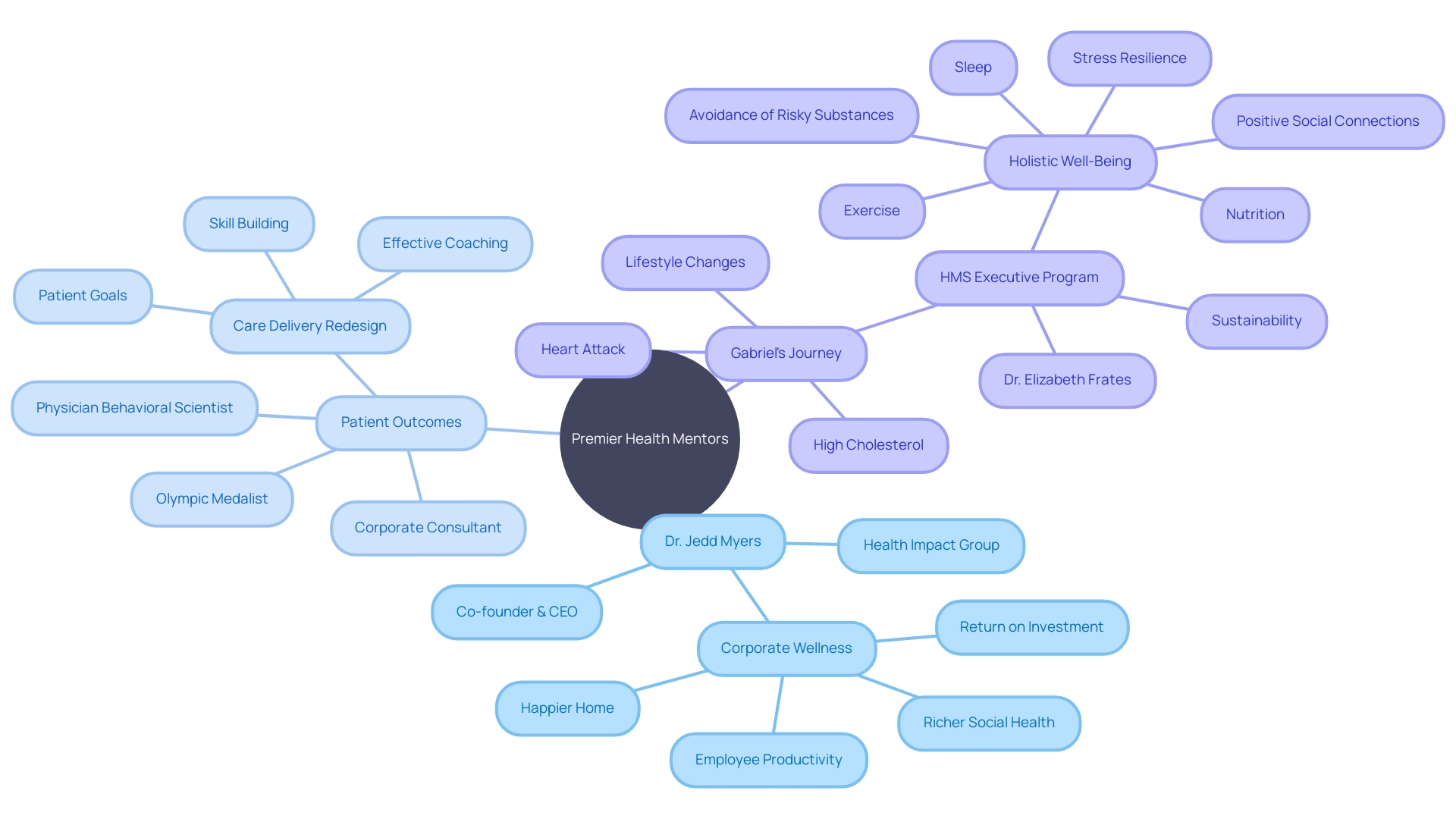
Knowledge and Continuous Learning
Top coaches in the field of well-being embody the belief that learning never stops, constantly growing. Their commitment to excellence shines through their relentless pursuit of knowledge and skills that set them apart in the evolving landscape of well-being. These dedicated professionals understand that the path to guiding others starts with their own continuous development. They immerse themselves in the latest research, partake in professional workshops, and earn certifications that enrich their expertise. It is this pursuit of lifelong learning that equips them to offer the most impactful strategies, helping clients to navigate the complexities of health with informed, innovative approaches.
The dynamic field of health coaching thrives on the cutting-edge contributions from a diverse array of experts. It utilizes knowledge from Olympic athletes and corporate consultants to physician behavioral scientists, all of whom promote a proactive approach to well-being. By emphasizing skill development and goal attainment, coaches can connect the divide between healthcare systems' desires for public well-being and the tangible results. The core of guidance in the field of well-being, as described by the International Coaching Federation, is to motivate the realization of personal and professional potential through a cooperative and stimulating process. This aligns with the multifaceted nature of well-being, which encompasses not just physical and mental health but also social, cultural, and environmental aspects.
Real-life success stories, like Gabriel's journey to holistic well-being through the HMS executive program, highlight the transformative power of health guidance. The program's comprehensive approach, which emphasizes sustainability and the interconnectedness of lifestyle factors, showcases the profound impact a structured and holistic mentoring program can have. As we navigate through technological advancements and the rapid evolution of necessary abilities, the role of health mentors becomes increasingly important. They are at the forefront of equipping individuals with the resilience and adaptability required to thrive in a world where the half-life of skills is diminishing.
The financial importance of guiding individuals towards better well-being is emphasized by its expanding market, valued at $7.6 billion with a strong growth path. The need for coaches in private practice, healthcare insurance, and corporate programs is evidence of their crucial role in promoting proactive initiatives and managing chronic conditions. Furthermore, the attractive mean yearly income for trainers in North America, as stated by the ICF, demonstrates the significance and efficiency of guiding individuals towards a healthy lifestyle in today's health-conscious society.
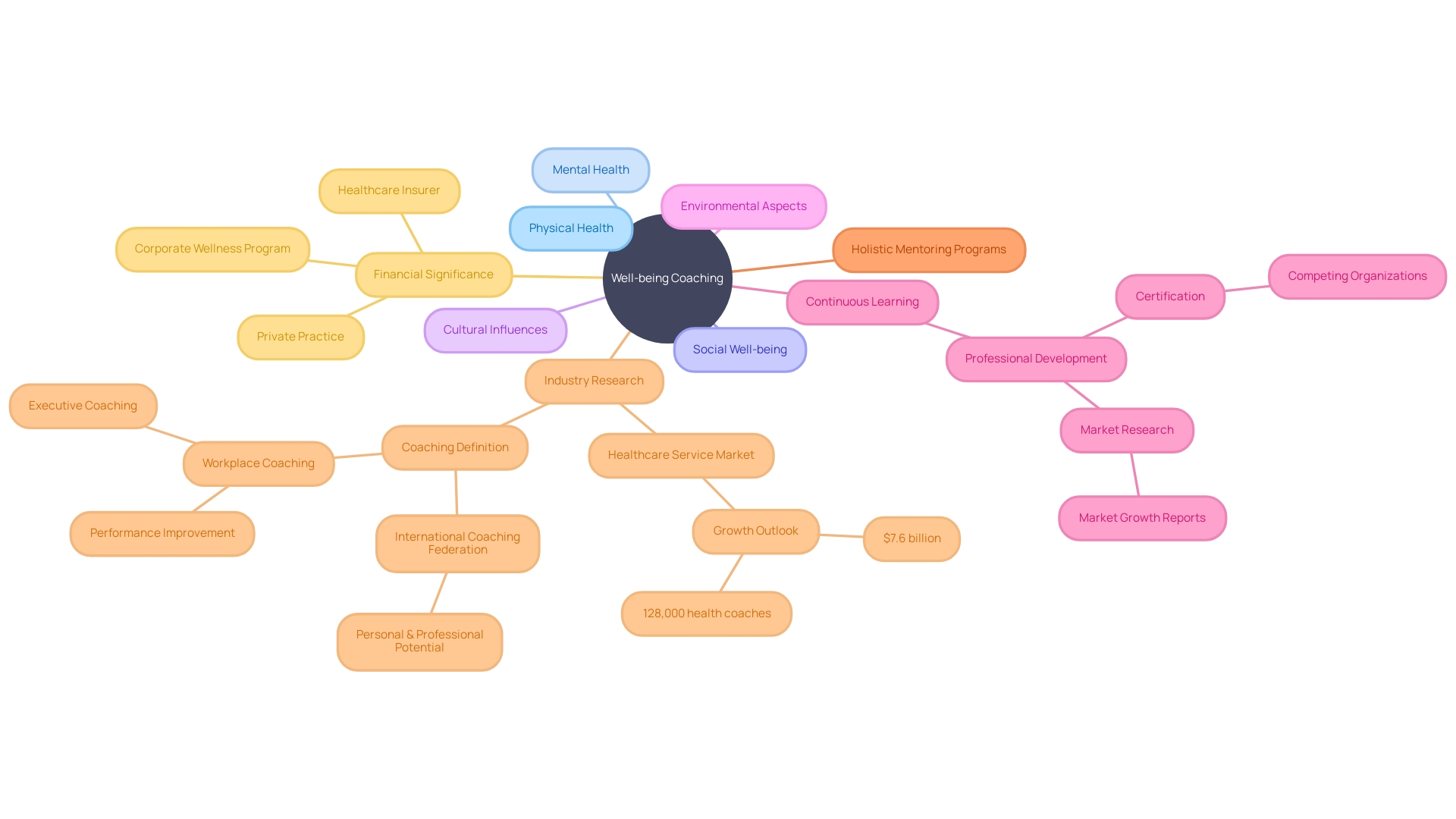
Adaptability and Flexibility
Elite health mentors thrive by developing personalized plans that assist individuals in reaching their distinct health and well-being goals. This personalization is the foundation of effective wellness guidance, as it recognizes the variety in individuals' needs and how they react to different guidance approaches. By engaging in a thought-provoking and creative process, coaches inspire clients to unlock their personal and professional potential, fostering an environment where sustainable lifestyle changes can thrive. Given the booming $7.6 billion market for customized wellness guidance services, it is evident that enhancing well-being through tailored support is not just a passing fad, but a vital aspect of proactive healthcare. The rise of wellness mentoring reflects a growing focus on preventive care, encouraging a transition from a reactive system to proactive support for patient objectives and competency enhancement. The incorporation of guidance in healthcare delivery has the potential to connect the divide between established objectives for population well-being and real results. As the field expands, wellness mentors are becoming essential contributors in forming healthcare systems that prioritize patient results, maximize resources, and address the difficulties of increasing medical expenses and clinician exhaustion.
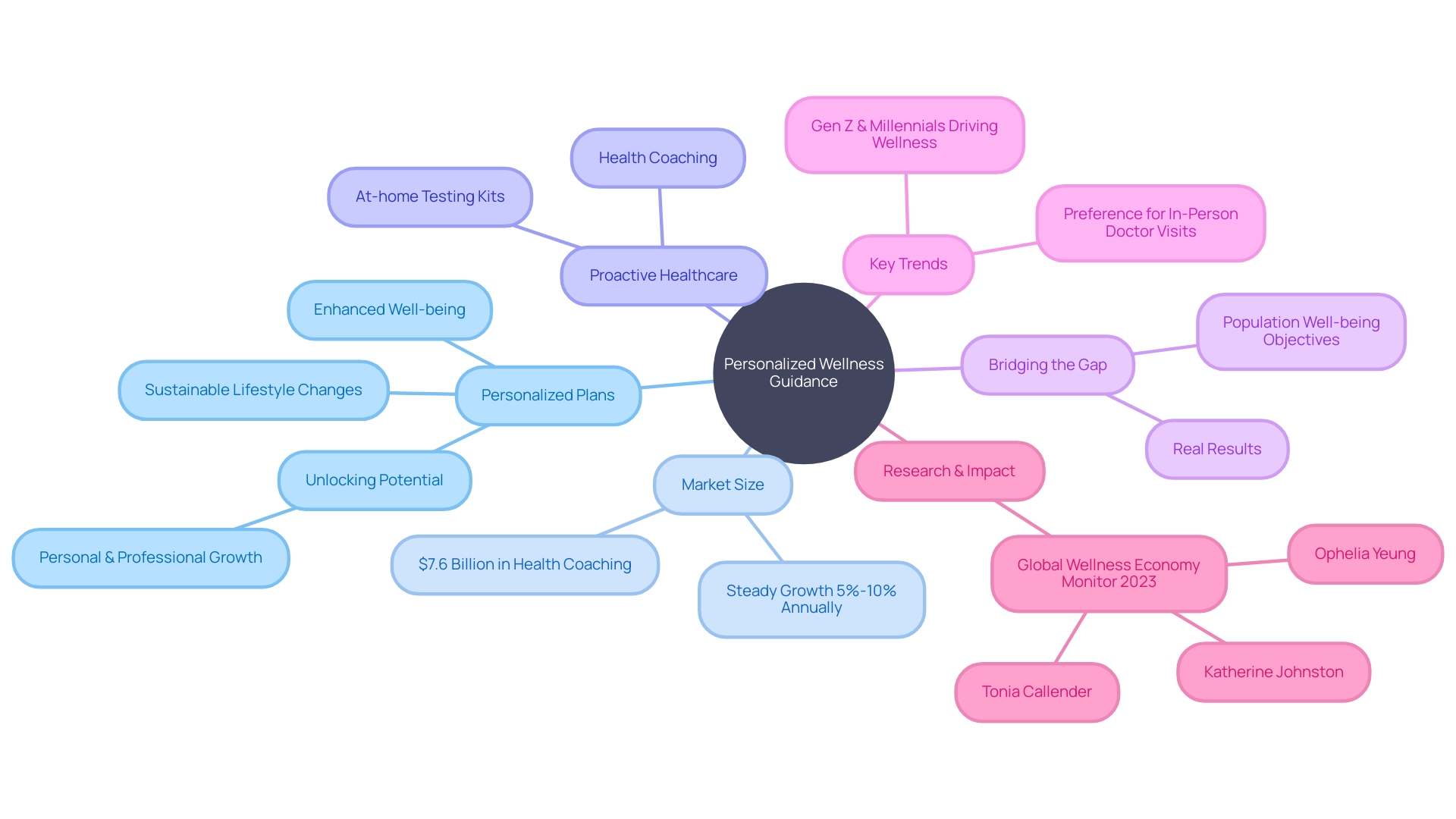
Goal-Oriented and Outcome-Based
Elite coaching goes beyond the traditional approach to physical and mental well-being. By collaborating with clients in a dynamic and inspiring journey, wellness mentors unlock their clients' full potential, both personally and professionally. The International Coaching Federation articulates this as a process that is both thought-provoking and creative. A wellness mentor's responsibility is to create a close and empowering connection with their clients, creating the foundation for significant transformation and assisting them in identifying and striving for their wellness objectives. It's about creating a care delivery system that not only predicts risks through advanced analytics but also actively supports clients in developing the skills to manage their well-being proactively. This is crucial in a healthcare landscape where high costs, subpar outcomes, and professional burnout are prevalent. The $7.6 billion mentoring market is responding to this need, with a growing workforce of over 128,000 mentors who are instrumental in guiding clients toward healthier lifestyles and better management of chronic conditions. By setting clear, achievable goals and providing consistent support, individuals specializing in well-being are at the forefront of transforming care from a reactive to a proactive system, ultimately leading to better patient outcomes and lower risks.
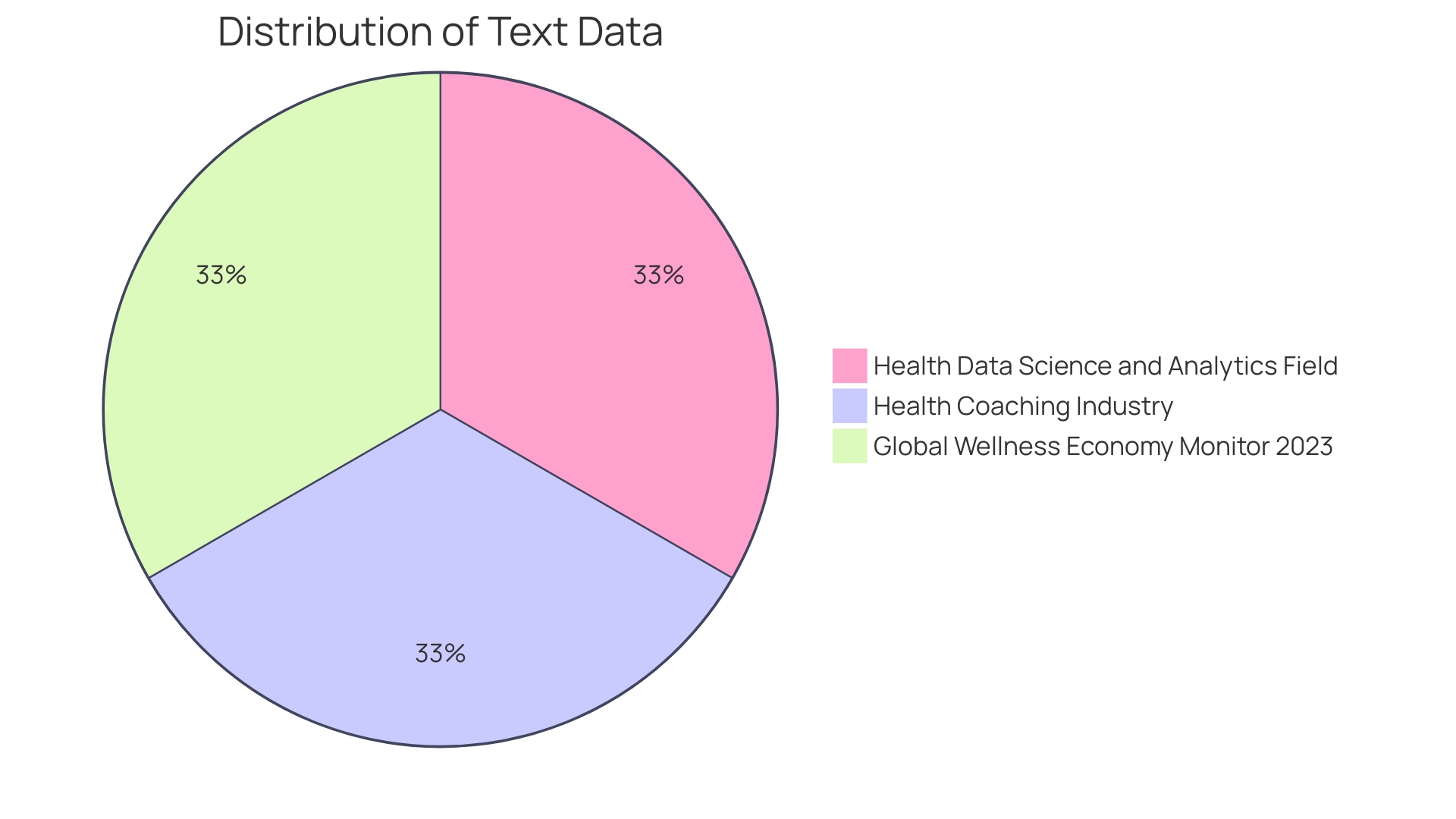
Focus on Holistic Wellness
Corporate health coaching has emerged as an invaluable asset to modern healthcare, transcending traditional treatment methods by embracing the full spectrum of an individual's well-being. These coaches delve into the multi-dimensional aspects of overall well-being, merging physical, emotional, mental, and social facets to foster a comprehensive approach to overall wellness. They serve as guides on the quest for equilibrium, steering clients through stress management, enhancing relationships, and promoting nutritional awareness and self-care practices. The essence of their role lies in recognizing the synergy between life's various components and aiding individuals in achieving their peak state of health.
The story of Gabriel Lee stands as evidence of the transformative power of comprehensive health. Following a life-altering heart attack, Gabriel ventured into the realm of lifestyle medicine, embracing the six pillars of a healthy lifestyle, as advocated by Harvard Medical School's Corporate Learning program. His journey highlights the potential of coaching to inspire and support individuals in cultivating a sustainable, balanced lifestyle.
Data from the Global Wellness Institute highlight the thriving industry of well-being, which dominates a market worth trillions of dollars with a growth path that surpasses global GDP. This underscores the escalating consumer interest in wellness activities, demonstrating the industry's profound impact on daily living and decision-making.
The philosophy of holistic wellness is based on the principle that mind, body, and spirit are interconnected, and emotional states can greatly impact physical well-being. This comprehensive framework does not solely aim to treat illnesses but also proactively promotes a lifestyle conducive to optimal well-being. It is this conviction in the mind-body connection and the innate healing power within each individual that mentors specializing in well-being channel into their practice, creating a nurturing environment for vitality and overall well-being.
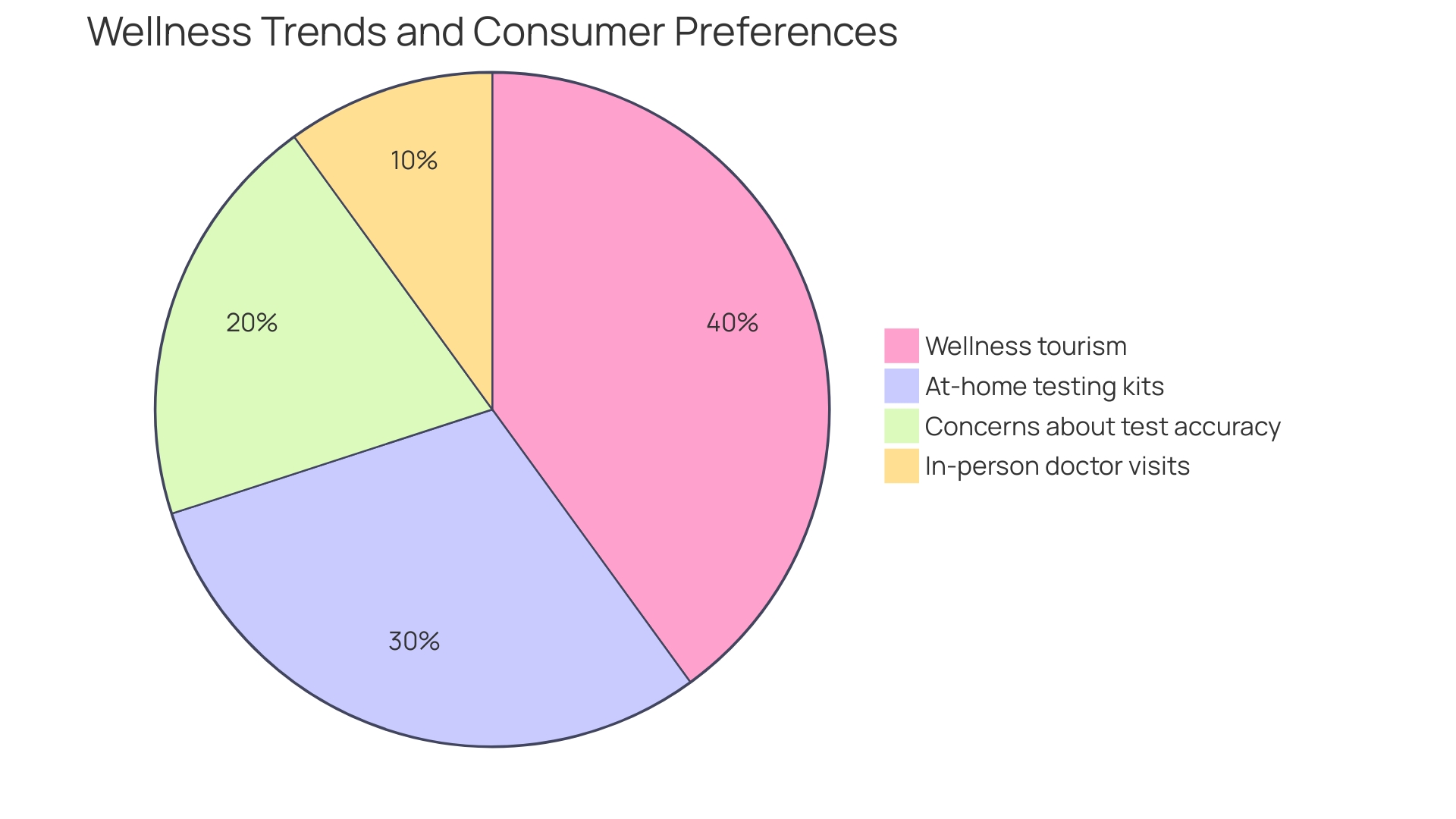
Client-Centered and Supportive
Leading wellness trainers are transforming the industry by incorporating customization and compassion into their mentoring techniques, similar to how a top-level advisor or an Olympic trainer would for high-performing athletes. They understand that each person's journey to well-being is unique, and so they devote careful attention to aligning their coaching strategies with the individual's values, beliefs, and life context. This approach is not just about setting goals; it's about creating a supportive environment that fosters skill-building and empowers individuals to take charge of their well-being.
Recent studies emphasize the importance of this tailored approach. For instance, a research collaboration between a behavioral scientist and an Olympic medalist highlighted the necessity for health systems to actively engage in patient goal-setting and provide the support needed to reach those goals. Likewise, a report by the International Coaching Federation characterizes the process as a collaboration that motivates clients to optimize their capabilities, which aligns with the personal, client-focused connection nurtured by leading wellness coaches.
Furthermore, the beneficial influence of such individualized guidance is supported by data. The Journal of Alzheimer's Disease published findings showing that individuals who received guidance on their lifestyle experienced a significant improvement in cognitive function over those who did not. This is evidence of the effectiveness of guidance when it's tailored to the needs of the client.
The industry focused on supporting individuals' well-being is thriving, currently estimated at a worth of $7.6 billion, with professionals in this field playing a vital part in overseeing chronic conditions and promoting lifestyle changes. This growth is indicative of a broader shift towards proactive management, where personalized coaching is becoming a cornerstone of care.
Adopting this trend, individuals specializing in promoting well-being are not merely responding to medical situations but actively striving to sustain well-being and assist clients, similar to the all-encompassing assistance provided to athletes. This involves crafting detailed plans that consider psychological needs, dietary requirements, and rest habits, while continuously providing encouragement and feedback. It's a process that champions quality over outcomes, and it's reshaping the way we think about well-being in our communities and workplaces.
Integrative and Multidisciplinary
Leading experts in holistic well-being are transforming the approach to vitality and overall well-being by embracing a diverse range of methodologies from different fields. They grasp that the voyage to optimal well-being is multifaceted, combining psychology, nutrition, mindfulness, and physical fitness. This integrative approach echoes the call from healthcare leaders for a more proactive and supportive healthcare system. By recognizing the distinct and interrelated elements of every person - physical, mental, emotional, and spiritual - top health coaches develop customized approaches that promote not only the lack of illness but the wholeness of well-being.
The International Coaching Federation defines the practice as a 'thought-provoking and creative process that inspires clients to maximize their personal and professional potential.' In line with this, wellness coaching transcends traditional paradigms by facilitating skill-building and goal achievement, as highlighted by a dual perspective from an Olympic medalist and a behavioral scientist. The current healthcare landscape, burdened by high costs and poor outcomes, necessitates a shift towards value-based care where comprehensive well-being integration is key. This approach is supported by the growing emphasis on predictive analytics and artificial intelligence in identifying risks, underscoring the need for systematic methods to lower these risks.
Holistic integration, which has become the focus in the industry, flourishes based on the principle that unwavering love and support are powerful healers. People are increasingly recognizing the importance of a balanced lifestyle that nurtures all dimensions of their existence. This concept is effectively communicated in the words of a holistic physician: 'Healing requires a collaborative approach involving the patient and doctor, and encompasses all aspects of an individual's life using a range of medical care practices.'
By tackling the underlying reasons for conditions and not just the symptoms, individuals are aided in living more fulfilling and balanced lives. This proactive stance towards well-being is not just beneficial for the individual; it also has a profound impact on the healthcare system. As studies suggest, engaging in regular physical activity can significantly alleviate chronic pain and improve overall well-being, highlighting the significance of an active lifestyle in the management of long-term conditions.
Accountability and Empowerment
Corporate wellness mentors play a crucial role in connecting healthcare goals and employee well-being. They are the catalysts who encourage individuals to take proactive steps in managing their well-being, rather than waiting for medical events to occur. This proactive approach is critical in a healthcare system that has been criticized for being reactive, particularly in the face of high costs and poor outcomes. Health coaches guide clients towards setting personal goals and developing the skills needed to achieve them, which aligns with the shift towards value-based healthcare that prioritizes patient outcomes over fee-for-service models.
Additionally, personalized guidance offers a tailored approach in healthcare delivery, a significant benefit in a landscape where there is a shortage of physicians and mental health workers. While coaching is distinct from therapy and is currently an unregulated field, it caters to a growing demand for accessible and affordable guidance in making life decisions and pursuing health goals. In the domain of chronic pain management, for instance, which incurs significant socioeconomic costs, coaches play a vital role. They empower individuals to adopt regular physical activity, which has been shown to alleviate pain severity, improve physical function, and enhance overall well-being.
Statistics reveal that well-being is not just a passing trend but a multi-trillion-dollar market with a profound influence on consumer behavior. Health guidance by itself represents a $7.6 billion market, emphasizing its significance in today's health-conscious society. The secret to unlocking the complete potential of health mentoring resides in establishing a culture of constructive responsibility, where mentors aid clients in defining definite outcomes and aligning their responsibilities with their objectives. This strategy not only fosters personal growth and autonomy but also contributes to the success of businesses by improving productivity and employee retention. As the industry continues to evolve, the inclusion of coaching services within corporate health programs is likely to become a more prominent and structured aspect of employee well-being initiatives.
Authenticity and Personal Connection
At the heart of transformative wellness is the power of authentic connections. Health coaches who excel in their field do more than administer advice—they cultivate relationships based on trust and openness. By drawing from personal experiences and insights, they create environments where clients can explore their well-being journeys with support and understanding. This approach is exemplified by Stevyn Guinnip, founder of Grow Wellthy, who merges her financial advising background with her passion for wellness to address the 'Big Swap'—the trade-off of well-being for financial success. Her method resonates with financial advisors, using familiar metrics and language to reframe concepts and motivate meaningful changes. The quest for well-being, as recommended by the World Health Organization, is not just the lack of sickness but a comprehensive condition of physical, mental, and social well-being. It's an ongoing journey of aligning one's inner wisdom with the external world, including guidelines on nutrition and exercise, as described in 'Intuitive Eating.' This philosophy aligns with current coaching trends, a burgeoning $7.6 billion market propelled by the increasing demand for proactive management. These coaches are making progress in personal practices, corporate programs, and healthcare insurers, driving a holistic approach to well-being that extends beyond traditional diet and exercise. As the industry of well-being prospers, with book sales reaching $800 million in 2020, it's evident that individuals are looking for direction to navigate their journeys of physical well-being. The expansion of well-being as a value system demonstrates a societal change towards self-care, mental health, and healthy living - a movement that continues to gain momentum.
Top Wellness Coaches and Their Expertise
With the industry of coaching for well-being growing into a $7.6 billion market, the role of coaches for physical and mental well-being is more crucial than ever. As guiding lights of change, these mentors are essential in transforming lives, directing individuals like Dr. Laurie and Gabriel through personalized wellness journeys. Dr. Laurie, a physician, knew the significance of muscle mass and, despite her busy lifestyle, succeeded in reshaping her body composition with a tailored strength training regimen. Similarly, Gabriel, who faced a heart attack in his 50s, embraced lifestyle medicine through a comprehensive program that highlighted the interconnectivity of various aspects, from nutrition to stress resilience.
To meet the growing demand, an estimated 128,000 wellness mentors are currently active, assisting clients in fighting lifestyle diseases and promoting proactive measures for well-being. With a wide array of expertise ranging from stress management and nutrition to fitness, these coaches are a treasure trove of support for those seeking to enhance their well-being. Their influence is experienced in different environments, from individual practices to corporate wellness programs, where they play a crucial role in reducing healthcare expenses while enhancing employee well-being.
The changing landscape of coaching, characterized by a shift to digital delivery and a focus on telehealth, underscores the adaptability and reach of these professionals. This transformation aligns with the current trend of proactive wellness management and the necessity to overcome barriers like busy schedules, which often lead to abandoned wellness resolutions. As the field continues to grow, health coaches not only promise a brighter future for individual health but also for the broader wellness economy, contributing to a thriving community that values holistic well-being.
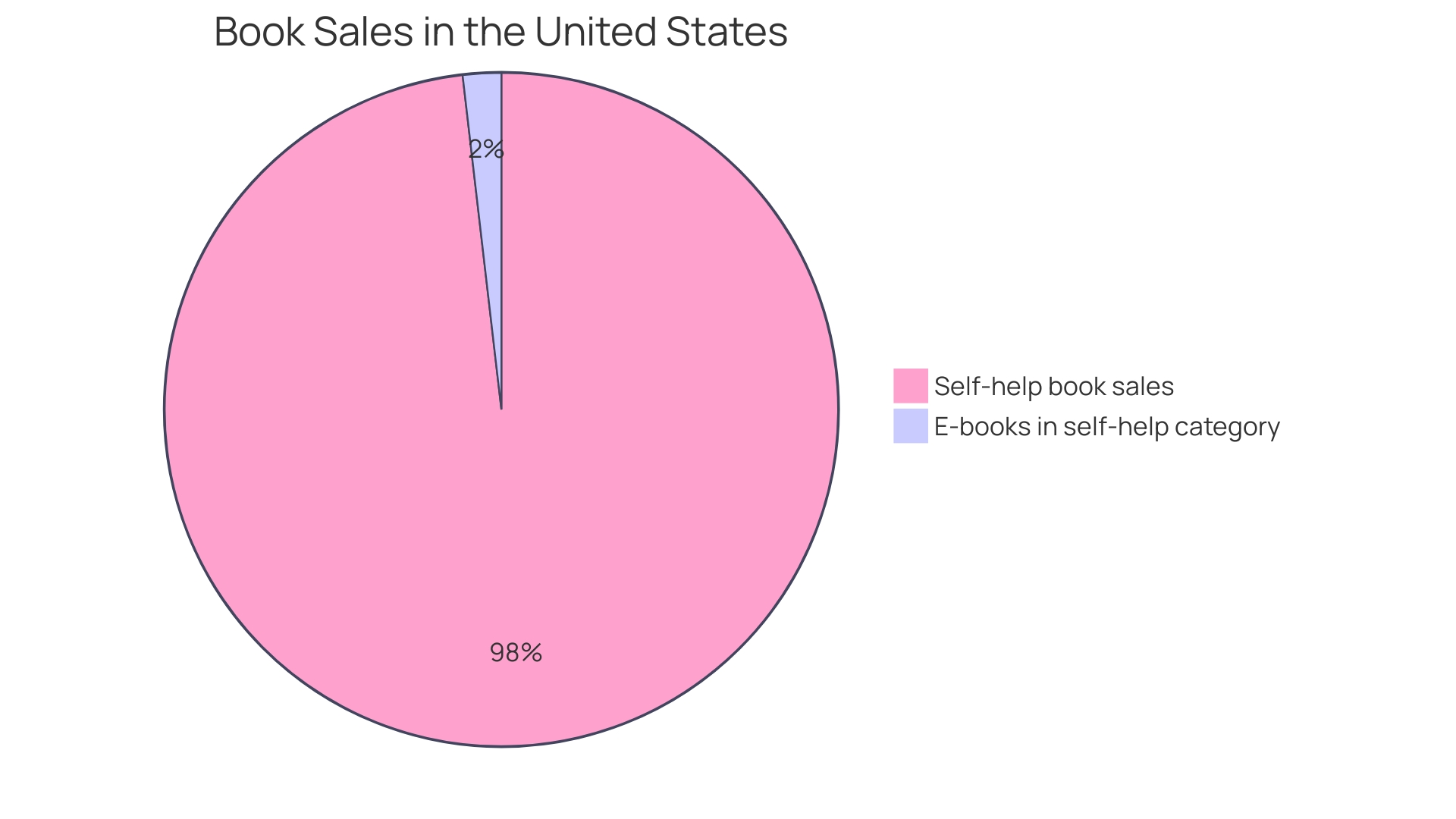
Conclusion
In conclusion, HR Benefits Managers have a vital role in promoting the well-being of their teams. This article emphasizes the importance of empathy, non-judgmental approaches, and tailored support for personal growth. Continuous learning and goal-oriented coaching are essential for crafting individualized strategies.
The adaptability and flexibility required in supporting employees' well-being are also highlighted.
By fostering accountability, empowerment, authenticity, and personal connections, HR Benefits Managers can create a positive work environment. This encourages personal and professional growth among team members.
In summary, HR Benefits Managers are encouraged to prioritize their team's well-being. Through empathetic approaches, continuous learning, and tailored support, they can create a positive work environment that supports personal growth and holistic wellness. By fostering accountability, empowerment, authenticity, and personal connections, HR Benefits Managers can make a profound impact on their team's well-being.




